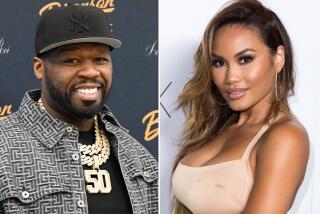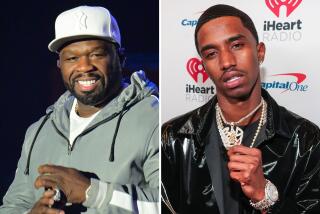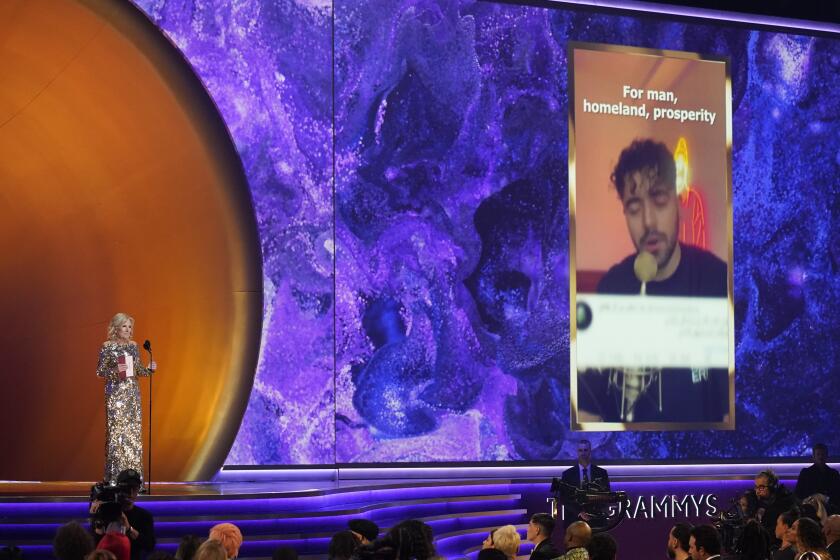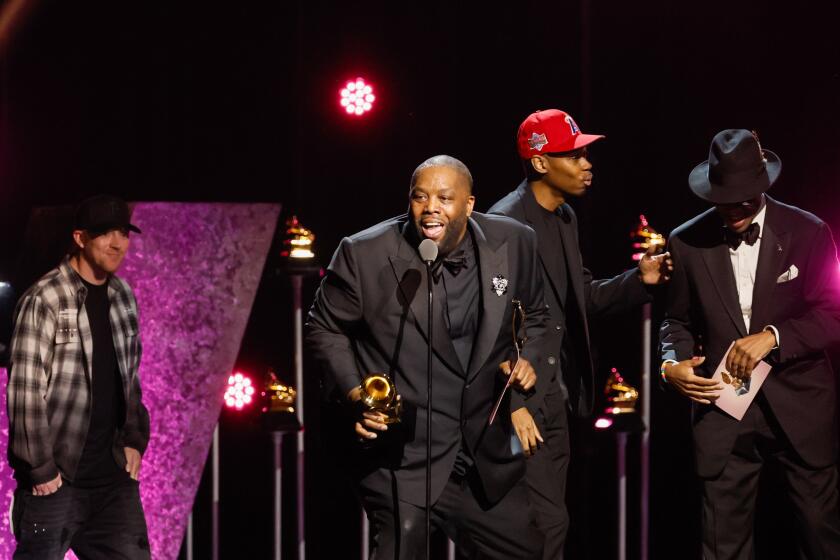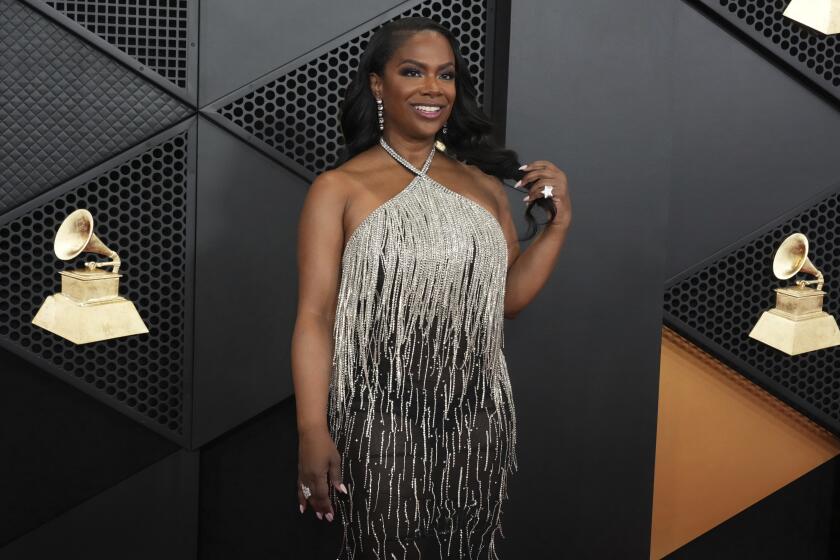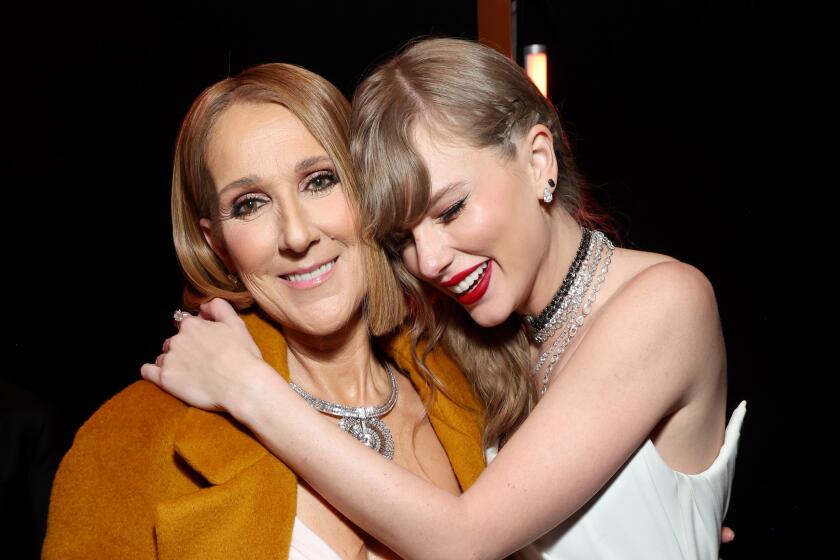They Hear Him Now
If Dr. Dre wins producer of the year honors at the Grammys on Wednesday, as is widely predicted, it will be a victory not only for the 36-year-old rap titan, but also for rap music itself.
By rights, Dr. Dre should have won a Grammy for producer of the year in 1989 for his work on N.W.A’s landmark “Straight Outta Compton,” the album that helped define gangsta rap.
But few record industry powers and Grammy voters took rap seriously enough then to consider nominating him. Some even argued that rap wasn’t a legitimate art form.
The level of respect for rap hadn’t increased enough to make Dre a producer nominee four years later when he delivered another album, “The Chronic,” that had an equally revolutionary effect on rap by mixing in classic R&B; and funk elements.
Dre’s latest accomplishments, however, were too noteworthy for Grammy voters to ignore. Besides producing several tracks on Eminem’s “The Marshall Mathers LP,” Dre delivered “Dr. Dre--2001,” his own formal follow-up to “The Chronic,” and it was another critical and commercial blockbuster.
During a break from work on his next album, Dre spoke about his five Grammy nominations, including producer of the year and best rap album, and some of the issues surrounding rap, including controversial content.
Question: How nervous were you when you released “Dr. Dre--2001”? It had been six years since “The Chronic,” and that’s an eternity in a musical field that changes as fast as rap. Some people were whispering that you had lost your touch.
Answer: I knew that it could be my make-or-break album--not as a producer but as an artist. If it didn’t catch on, I wasn’t going to try another solo album.
There might be some artist who comes along with new [sounds] and causes people to race after them--just the way fans turned their back on Elvis Presley for the Beatles. You always have to be prepared for when your time is up as an artist.
Q: How would you feel if you gave up the artist side and were just a producer? Would you miss it?
A: I don’t think it’d mean anything to me either way. The thing I’m proud of is the production. That’s my thing. Someone talked me into doing the “Chronic” album and it worked, so I kept at also trying to be the artist on the records.
Q: There is so much debate in the pop world over the content of rap albums, from Eminem’s record to Tupac Shakur’s records. But there’s another school of thought that the beat is the only thing that matters. When you are making a record, what do you focus on most? What’s more important: the content or the sound?
A: It’s both. You can have a song that has [lame] content with a good beat and that’s all you’re going to get out of it. People might play it in a club where they’re not paying attention to the words--where they could just as well be playing an instrumental. But the content is important if you are in another [setting] and people do think about what you’re saying in the record. To make a record work in that circumstance, you have to have everything--the right beat, the right tempo, the right words, the right performance.
Q: After your marriage in 1996, you started wrestling with some of the violent and X-rated themes of hard-core rap. You even softened the tone of the music for a while. But you returned to the hard-core style on “Dr. Dre--2001.” What was behind that?
A: I realized that music is me. I like doing crazy, wild music. It’s what I do best. I like N.W.A. I like Eminem. I like Richard Pryor. As a kid, I used to listen to Richard Pryor and Redd Foxx and just roll on the floor. It was funny and it was wild.
Q: Are there limits on that wild side? There has been so much criticism in some circles about some of the language on the Eminem album, for instance--especially the references to gays and lesbians. What do you say to those people?
A: Well, that’s really a question for Eminem because it’s his words. But generally, my thought is that if you don’t understand the humor then it’s not for you. When we go into the studio, we’re not going, “Let’s see who we can [tick] off. Let’s mess around with people’s parents.” Half the time, I’m on the floor laughing at some of the stuff that comes out of Eminem’s mouth. The [stuff] is funny to me. It’s straight dark comedy.
Q: Does it worry you that kids as young as 10 or 12 listen to the music?
A: There are stickers on the album--and I think it’s important for parents to pay attention to what’s happening. I’m not sure I would go buy an Eminem record for my oldest son. There is some stuff on there that I don’t think is appropriate for children, but we’re not making records for children. We’re not Disney.
Q: Do you have a target audience in mind when you go into the studio, either on your own or with Eminem?
A: No. When I go into the studio, I try to please myself first. If I please myself, then I start thinking about the public. I start letting people hear what I’ve done and watch how they react. Sometimes we have little functions to test the music. We don’t tell them we are going to play something new because we want their honest reaction.
Q: What if you love a record, but people don’t seem to care about it when you play it for them? Would you trust your own instincts and put it out anyway?
A: No. I may feel the record is the best one I ever made, but if I play it and nobody moves, I’m not going to put that record out. It’s as simple as that. . . . ‘Cause I’m not the one who has to buy it.
Q: How surprised were you in the N.W.A days when the music started reaching beyond the original rap audience and selling to suburban kids?
A: We were totally shocked because we started out just going into the studio to make records to bang in our neighborhood. I have no clue just what our fan base is today. I was in Las Vegas one time, and a group of nuns came up to me and asked me for an autograph and pictures. That’s the last thing that is on my mind--what culture is going to buy the music or what race. I make my music for whoever wants to listen to it.
Q: What about the Grammy award? Do the five nominations mean a lot to you?
A: Absolutely. It would really please me if I won producer of the year. I wasn’t expecting that at all, to tell you the truth. But it’s cool. It lets me know that someone out there is really checking the music out.
Q: Who are some of the producers that were influences on you over the years?
A: Quincy Jones for sure. I love the sounds he uses on his records, the musical arrangements. I listen to his soundtracks and his scores--the way he uses flutes and other strange instruments to come up with colors. . . . It’s like a beautiful painting.
Q: Anyone else?
A: George Clinton is amazing. He came into the game with his own thing and made it work. He blends all these sounds together on his records, making music out of what may at first sound like chaos if you’re not paying attention. I love people that come up with something original like that. I think Barry White and Isaac Hayes are also brilliant producers.
Q: What about the lack of respect for rap all these years--people saying it wasn’t real music because so much of it was built around samples?
A: Well, my music isn’t samples. Every now and then we use a sample, but most of the music on my record is from my brain and the people working around me. It is an art form. I bet any of those people who are saying that it’s not real music couldn’t make a rap record. But rock ‘n’ roll was put down for years too, and it’s still around. In some ways, it’s motivating when people put you down. It makes you work harder to prove them wrong.
Q: What about your next album? Do you have the concept yet?
A: No, we’re just in the blueprint stage. But it’ll be just as crazy as “Dr. Dre--2001.” The difference is it’ll be in 5.1 surround sound, which excites me because it gives me a whole new sonic universe to work with--two extra speakers. You are going to have sound in front of you and behind you, just like in a movie theater. You can be listening to one of my songs and a car can go by you in the background. . . . It’s gonna be something.
It hasn’t made sense until now to make a record in 5.1 surround sound because so few people had systems in their home to listen to it correctly. But a lot of people have bought DVD players, and they often get a surround sound so they can get all the sound effects.
I’m taking out an entire year to make this album, so it probably won’t be in the stores until the fall or summer of 2002. I’m going to call it “Detox” and I want it to be a record that producers are going to look back on in 10 years and say, “That was something special.” It’s just the way I go back and listen to certain albums for ideas and inspiration.
*
THE GRAMMY AWARDS SHOW
Day: Wednesday
Where: Staples Center
TV: CBS, 8 p.m.
*
PREDICTIONS
Hilburn handicaps the top pop categories. Page 66
How other slots shape up, Page 72
More to Read
The biggest entertainment stories
Get our big stories about Hollywood, film, television, music, arts, culture and more right in your inbox as soon as they publish.
You may occasionally receive promotional content from the Los Angeles Times.

